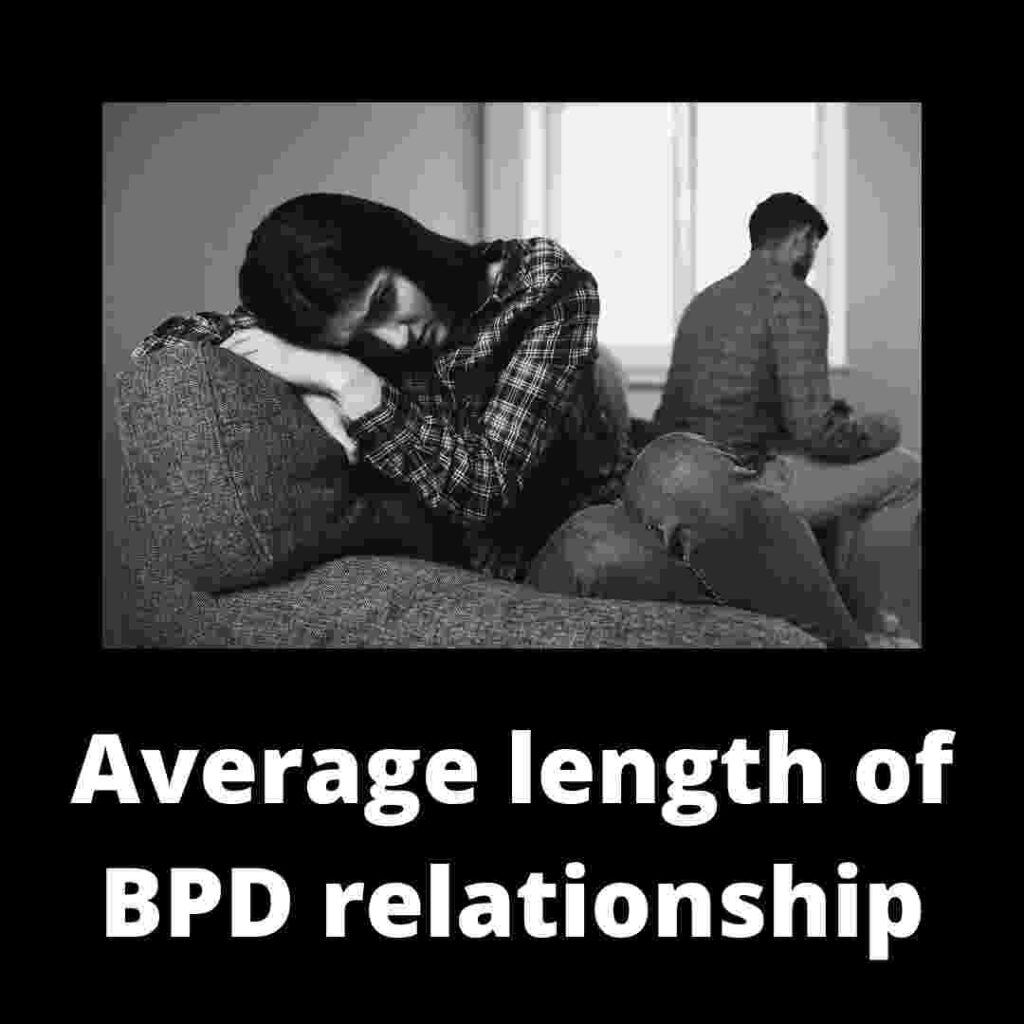People with borderline personality disorder commonly have relationships that are full of chaos and conflict, so what is the average length of BPD relationship?
Thus it is very important to educate yourself about this disorder and what it entails if you have someone in your life who suffers from it if you are considering starting a relationship with such a person.
If you have been diagnosed with BPD, this article may shed some light on how your symptoms may be affecting your relationship.
What is borderline personality disorder?
Table of Contents
At the beginning of a relationship
If the person is having BPD but is not getting it treated, the unstable moods can start after a week or two. The partner of a BPD sufferer may experience something like their soulmate.
However, this feeling will be short-lived. Since the BPD sufferer may start to exhibit behavior incomprehensible to you, leaving you perplexed over what is happening. You are on the way to having an unhealthy and codependent relationship with someone exhibiting BPD traits.
In the beginning, the healthy partner will feel most calm and secure even leading the partners of BPD sufferers to let their guard down and drift into a comfortable routine, only to find after some time a violent sometimes relentless domestic life.
If you are experiencing this then you are in your partner’s cycle of idealization and devaluation. This may create the possibility of healthy and secure stable interactions difficult. This is because the borderline person’s emotions cycle back and forth between two extremes while undergoing feelings of idealization, the BPD sufferer will only portray their positive qualities. These positive qualities may be about them or their partners, about everything around them in the world, these are periods of intense highs.
Whereas in the devaluation phase they will only see the negative things about the same person, same world. This is the period of their intense lows.
You need to understand if a BPD sufferer is telling you all positive things about you, how happy they are to have met you, and how perfect you are. This positive elation about you is true for they are feeling that way about you at that moment.
But remember phrases such as those from a BPD sufferer may mean that they are in their idealization phase and that you never know when this phase may end.
They can have a significant rapid mood swing into the devaluation phase.
BPD relationship cycle may have 6 stages
Stage 1
Your BPD Sufferer partner may view you as ‘the one. Their soulmate idolizes you. This happens shortly after you begin dating. They will always make time for you and will seem serious and committed to making this relationship work.
Stage 2
In this stage, your relationship may be laced with anxiety and fear of abandonment. Your BPD suffering partner may become highly sensitive to things like missed text or forgetting something they deemed too important.
In this stage, you will see symptoms in them like fear of abandonment
– Paranoid thoughts
This leads them to have thoughts like you are no longer interested in the relationship and want to leave them.
Stage 3
Due to the above-mentioned things happening during those stages, the fear of abandonment consumes them and they may start testing you or even pushing you away sometimes. These things can cause arguments and will cause your partner to feel as if you are pulling away.

Stage 4
Your partner may start acting differently. Suddenly everything perfect was never there. The BPD sufferer may try emotionally leave you before you leave them. This will cause confusion and pain. BPD partner may fixate on that you are going to leave. They may ask you continuously to confirm your feelings and interest in them.
Stage 5
During this phase, your BPD partner is done with you and wants to do nothing with you anymore because now they don’t find your existence in their life as something of value. You are not perfect to them anymore.
Stage 6
In this recovery /hoovering stage your ex-partner suffering from Borderline personality disorder may try to regain your affection. Sometimes there is no stage 5 discard but rather a direct recovery stage. This may happen when they realize that you have some usefulness left for them.
Lastly, they may realize that it’s not worth salvaging the relationship and feel lonely as reality sets in.
Leaving a BPD partner
It is not easy for many people. People tend to look back at all the happy times they had together and wonder why did they break up. People often feel relieved and distressed when their relationship got over. BPD relationships are very complex although sometimes abusive they may be rewarding too because BPD partners can be funny, charming generous, and lovable. Many people don’t want to give up because of the good times they had in the past and they don’t want to give up completely.
Conclusion about average length of BPD relationship
Normal couples don’t have a set time limit in their relationship. They go through a lot together and feel deeply about each other during those times.
The average length of BPD relationship seems to be not clear but still, most people experiencing it have said that it ranges from 2 to 5 years with BPD sufferers. In rare cases, it can last a decade. It’s important to know that there is no normal when it comes to relationships and how long they may last.
Read more about do borderlines come back after discard.
Disclaimer
The content of this article “Average length of BPD relationship” has been developed by third-party medical content writers and/or experts. The information mentioned in the article is only for educational purposes and therefore it is requested to consult a doctor/ physician before diagnosing and deciding the treatment plan.
Healthoplane, its Licensors nor any third-party content providers do not guarantee the accuracy, completeness, or usefulness of any content. Furthermore, neither Healthoplane nor its Licensors endorse or are responsible for the accuracy and reliability of any opinion, advice, or statement made on this article or any of the Sites or Services.
We take no responsibility for your exposure to third-party content on the Sites or the Services. Healthoplane and its Licensors do not assume, and expressly disclaim, any obligation to obtain and include any information other than that provided to it by its third-party sources. It should be understood that we do not advocate the use of any product or procedure described in the Sites or through the Services, nor are we responsible for misuse of a product or procedure due to typographical error.
Consent
By using our website, you hereby consent to our disclaimer and agree to its terms.
Dr Amit Sharma is a Doctor and writer with a particular interest in mental health. He helps individuals by combining practical advice with emotional support.
